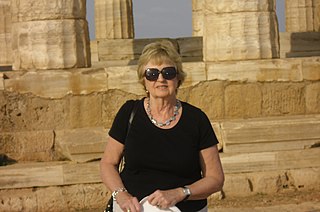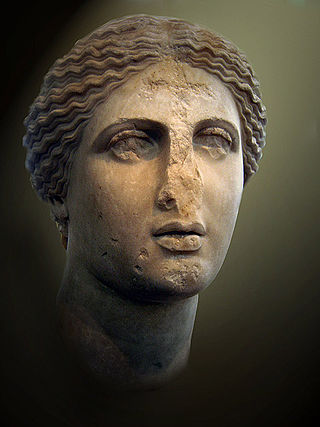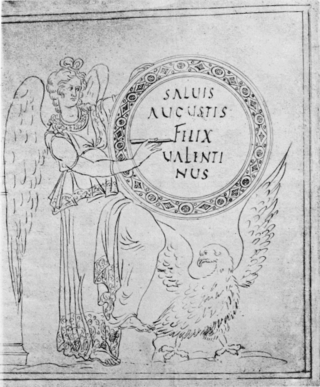
Clare Hall is a constituent college of the University of Cambridge. Founded in 1966 by Clare College, Clare Hall is a college for advanced study, admitting only postgraduate students alongside postdoctoral researchers and fellows. It was established to serve as an Institute of Advanced Studies and has slowly grown and developed into a full constituent college.
Julius Lipner, who is of Indo-Czech origin, was Professor of Hinduism and the Comparative Study of Religion at the University of Cambridge.

Dame Averil Millicent Cameron, often cited as A. M. Cameron, is a British historian. She writes on Late Antiquity, Classics, and Byzantine Studies. She was Professor of Late Antique and Byzantine History at the University of Oxford, and the Warden of Keble College, Oxford, between 1994 and 2010.

The growth of Christianity from its obscure origin c. 40 AD, with fewer than 1,000 followers, to being the majority religion of the entire Roman Empire by AD 400, has been examined through a wide variety of historiographical approaches.
Debora Kuller Shuger is a literary historian and scholar. She studies early modern, Renaissance, late 16th- and 17th century England. She writes about Tudor-Stuart literature; religious, political, and legal thought; Neo-Latin; and censorship of that period.
Yitzhak Hen is Anna and Sam Lopin Professor of History, formerly at Ben-Gurion University of the Negev (Israel). Since August 2018 he has been the director of Israel Institute for Advanced Studies at the Hebrew University of Jerusalem.

Persecution of pagans in the late Roman Empire began during the reign of Constantine the Great in the military colony of Aelia Capitolina (Jerusalem), when he destroyed a pagan temple for the purpose of constructing a Christian church. Rome had periodically confiscated church properties, and Constantine was vigorous in reclaiming them whenever these issues were brought to his attention. Christian historians alleged that Hadrian had constructed a temple to Venus on the site of the crucifixion of Jesus on Golgotha hill in order to suppress Christian veneration there. Constantine used that to justify the temple's destruction, saying he was simply reclaiming the property. Using the vocabulary of reclamation, Constantine acquired several more sites of Christian significance in the Holy Land.

Guy Gedalyah Stroumsa is an Israeli scholar of religion. He is Martin Buber Professor Emeritus of Comparative Religion at the Hebrew University of Jerusalem and Emeritus Professor of the Study of the Abrahamic Religions at the University of Oxford, where he is an Emeritus Fellow of Lady Margaret Hall. He is a Member of the Israel Academy of Sciences and Humanities.
John Richard "Jaś" Elsner, is a British art historian and classicist, who is Professor of Late Antique Art in the Faculty of Classics at the University of Oxford, Humfry Payne Senior Research Fellow in Classical Archaeology and Art at Corpus Christi College, Oxford, and Visiting Professor of Art History at the University of Chicago. He is mainly known for his work on Roman art, including Late Antiquity and Byzantine art, as well as the historiography of art history, and is a prolific writer on these and other topics. Elsner has been described as "one of the most well-known figures in the field of ancient art history, respected for his notable erudition, extensive range of interests and expertise, his continuing productivity, and above all, for the originality of his mind", and by Shadi Bartsch, a colleague at Chicago, as "the predominant contemporary scholar of the relationship between classical art and ancient subjectivity".
Sabine Renate Huebner/Hübner is Professor of Ancient History at the University of Basel (Switzerland) and Head of Department. She is an expert on the religious and social history of antiquity, particularly of Graeco-Roman Egypt.

Ilaria L. E. Ramelli is an Italian-born historian, academic author, and university professor who specializes in ancient, late antique, and early mediaeval philosophy and theology.

Julia Hillner is Professor for Dependency and Slavery Studies at the University of Bonn. She was previously Professor of Medieval History at the University of Sheffield. She is an expert on late antiquity, applying digital methods of social network analysis to large data sets drawn from a wide variety of late antique and early medieval sources.
Wendy Mayer is an Australian scholar in late antiquity and religion who is a research professor and associate dean for research at Australian Lutheran College, dean of research strategy for the University of Divinity, and honorary research fellow at the University of South Africa. She is known for her work on John Chrysostom and on early Christian preaching.

Michele Renee Salzman is a distinguished professor of history at the University of California, Riverside. She is an expert on the religious and social history of late antiquity.

Claire Sotinel is a Professor of Ancient History at l'Université de Paris-Est Créteil. She is an expert on Italy in late antiquity, religion, society, and prosopography.

Victoria Leonard is a British Classicist specialising in the study of religion, gender, and the body in Late antiquity. She is a Post-Doctoral researcher at Royal Holloway, University of London and a research fellow at the Institute of Classical Studies. She holds a PhD from Cardiff University. Leonard was elected as a Fellow of the Royal Historical Society in July 2019.
Ann Marie Yasin is an Associate Professor of Art History and Classics at the University of Southern California specializing in the architecture and material culture of the Roman and late antique world. She studies materiality, built-environments, landscapes, and urbanism as they pertain to the ancient and late ancient religious worlds.
Annette Yoshiko Reed is an American religious historian. She is currently a professor in the Skirball Department of Hebrew and Judaic Studies and Department of Religious Studies at New York University. Reed's research interests span the topics of Second Temple Judaism, early Christianity, and Jewish/Christian relations in Late Antiquity, with particular attention to retheorizing religion, identity, difference, and forgetting. She is the daughter of political scientist Steven Reed.
Catherine Hezser is Professor of Jewish Studies at the School of Oriental and African Studies, University of London. She specialises in rabbinic Judaism, the early history of Judaism in the Near Middle East, and the social history of the Jews in Roman Palestine during late antiquity.

Kristina Sessa is Professor of History at Ohio State University. She is an expert on the cultural history of the late antique and early medieval Mediterranean world from ca. 300-700 CE.











